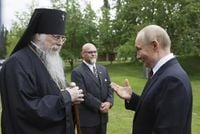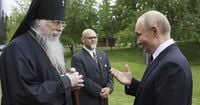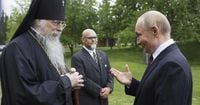On August 15, 2025, a seemingly quiet ceremony at Fort Richardson National Cemetery in Anchorage, Alaska, set off a wave of controversy and soul-searching across the Orthodox Christian world. There, Archbishop Alexei, the Orthodox bishop of Alaska, met with Russian President Vladimir Putin, who was fresh from a summit with U.S. President Donald Trump. The two men exchanged warm greetings and gifts of holy icons, standing together among the graves of Soviet-era airmen killed during World War II, as reported by The Canadian Press and the Associated Press.
Putin, in a gesture laden with symbolism, placed flowers on the graves before turning to Archbishop Alexei. The archbishop, head of the Orthodox Church in America’s Alaska diocese—a body that traces its roots to Russian missionary activity during the czarist era—expressed deep gratitude for the faith those missionaries brought to Alaska. “Russia has given us what’s most precious of all, which is the Orthodox faith, and we are forever grateful,” Alexei told Putin, according to AP. He added that visits to Russia by himself and his clergy felt like returning home. Putin, for his part, replied, “Please feel at home whenever you come.”
Yet this display of ecclesiastical and cultural kinship did not unfold in a vacuum. The backdrop is the ongoing war in Ukraine, a conflict that has not only devastated lives and cities but also fractured Orthodox Christian communities worldwide. The meeting between Alexei and Putin was swiftly and sharply condemned by Ukrainian Orthodox bishops in the United States. In a statement signed by Metropolitan Antony and Archbishop Daniel of the Ukrainian Orthodox Church of the USA, the bishops called the encounter “a betrayal of Christian witness” and “scandalous to the faithful.”
The statement, published by AP, minced no words: “The Russian regime is responsible for the invasion of the independent and peaceful nation of Ukraine and for the death of hundreds of thousands, for the disappearance of countless innocents, for the tearing of families apart, and for the deliberate destruction of Ukraine. To extend warm words of welcome and admiration to this ‘leader’ is nothing less than an endorsement of his actions.” The bishops further insisted that while the church preaches love and forgiveness, it “can never excuse or whitewash evil.”
For many, the optics of the meeting were especially fraught. Putin’s public displays of Orthodox piety—making the sign of the cross at the cemetery, kissing icons—have been a regular feature of his presidency. But critics argue that these gestures are part of a broader campaign to conflate Russian state interests with religious authority, particularly as Moscow Patriarch Kirill, head of the Russian Orthodox Church, has declared the war in Ukraine a “holy war” and promised forgiveness of sins for Russian soldiers who die in combat.
Archbishop Alexei, clearly aware of the controversy, attempted to clarify his intentions in a message to Alaska priests. He stressed that his words of gratitude were not praise for “present politics, but a remembrance of the missionaries of earlier generations … who brought us the Orthodox faith at great cost.” He also emphasized that the veneration of holy icons is directed not toward the giver but to the saint or feast they represent. “Even if the greatest sinner were beside me, the honor passes not to him but to heaven itself,” he wrote, as reported by AP. “I know that sacred gestures can be misunderstood, and I grieve if this has caused confusion or scandal.” He added that it’s important “to open whatever small door may be given for a pastoral word of peace.”
Still, many in the Orthodox world see the meeting as emblematic of deeper rifts. The Orthodox Church in America, though now administratively independent, remains a spiritual heir to Russian Orthodoxy. Alaska itself is home to about 30,000 Russian Orthodox faithful, a legacy of the Russian Empire’s presence before the territory was sold to the United States in 1867. Yet Orthodox Christianity in the United States is far from monolithic. Multiple jurisdictions exist, reflecting the diverse waves of immigration and the complex tapestry of national and ecclesiastical loyalties. The Ukrainian Orthodox Church of the USA, for example, operates separately and has been outspoken in its support for Ukraine’s sovereignty and condemnation of Russian aggression.
The schism within Ukrainian Orthodoxy itself adds further layers of complexity. Ukraine is home to both the Ukrainian Orthodox Church, historically under the Moscow Patriarchate, and the breakaway Orthodox Church in Ukraine, which received recognition as an independent church from the Ecumenical Patriarch of Constantinople. Both have condemned the Russian invasion, but the former has faced suspicion and legislative pressure from the Ukrainian government, which last year passed a law banning religious groups tied to the Russian Orthodox Church or any faith group supporting the invasion. The Ukrainian Council of Churches and Religious Organizations, a coalition including the Orthodox Church of Ukraine, has supported the government’s insistence that the Moscow-linked church demonstrate its independence, while also asserting Ukraine’s commitment to religious freedom and pluralism.
Putin, meanwhile, has continued to frame the conflict in religious terms. He recently stated that any peace settlement must include “providing an adequate environment for the Orthodox Church and the Christian faith in Ukraine,” though he did not elaborate on what that would entail. For many observers, this rhetoric is seen as an attempt to justify political and military objectives under the guise of protecting religious rights.
Within Alaska, the meeting has prompted introspection among Orthodox Christians. Some see it as an opportunity to honor the shared spiritual heritage between Russia and Alaska, focusing on the sacrifices of early missionaries and the endurance of faith across centuries. Others, particularly those with ties to Ukraine or who are sensitive to the optics of legitimizing Putin amid an active war and an International Criminal Court warrant for alleged war crimes, feel betrayed or at least deeply unsettled.
The controversy has also highlighted the broader entanglement of faith and politics in the Orthodox world. As The Canadian Press and AP have noted, American Orthodox churches have long navigated tensions rooted in the old world—tensions that have only intensified since Russia’s 2022 invasion of Ukraine. The question now, as one church leader put it, is how to maintain “Christian witness” and unity in a time of war and division, when even a gesture of hospitality can be interpreted as a political statement.
For now, the events in Anchorage serve as a stark reminder that, in the Orthodox Christian world, history is never far from the present—and that faith, politics, and identity remain deeply intertwined, sometimes painfully so.




